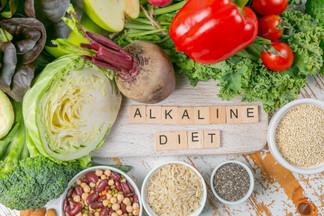Posted by Dee Cee Labs on Jun 11th 2025
The Role of Alkaline Diets in Supporting Spinal Health and Recovery
Spinal health is foundational to overall well-being, influencing mobility, nervous system function, and quality of life. While chiropractic care is highly effective in addressing spinal misalignments, recovery and long-term spinal health also depend heavily on lifestyle choices, including diet. One dietary approach gaining attention for its potential to support spinal health is the alkaline diet.
An alkaline diet focuses on balancing the body’s pH levels through food choices, which can reduce inflammation, support bone strength, and optimize recovery from spinal issues.
Understanding the Alkaline Diet
The alkaline diet is based on the concept that certain foods produce acidic or alkaline byproducts in the body after digestion. It encourages consuming more alkaline-forming foods while limiting acid-forming ones.
- Alkaline-Forming Foods: Fruits, vegetables, nuts, seeds, and legumes.
- Acid-Forming Foods: Processed foods, red meat, refined sugars, dairy, and alcohol.
Although the body naturally regulates its pH levels, especially in the blood, diet influences other areas, such as urine and interstitial fluid, which can impact inflammation, bone density, and overall cellular health.
How Alkaline Diets Benefit Spinal Health
1. Reducing Inflammation
Inflammation is a common factor in back pain, herniated discs, and other spinal issues. Acid-forming foods can exacerbate inflammation, while alkaline-forming foods help neutralize it.
- Key Alkaline Foods for Inflammation: Spinach, kale, broccoli, avocados, and almonds contain antioxidants and anti-inflammatory compounds that soothe irritated tissues around the spine.
By reducing inflammation, an alkaline diet complements chiropractic care, enhancing recovery and promoting long-term spinal health.
2. Supporting Bone Strength
The spine’s structural integrity depends heavily on bone health. Acidic diets may contribute to bone demineralization as the body leaches calcium from bones to neutralize excess acidity. An alkaline diet helps preserve bone density by reducing the need for such buffering.
- Alkaline Foods for Bone Health: Leafy greens (rich in calcium and magnesium), oranges, figs, and almonds provide essential nutrients that strengthen the vertebrae and prevent bone-related conditions like osteoporosis.
This support is especially critical for aging individuals or those recovering from spinal injuries.
3. Enhancing Muscle Function and Recovery
Muscles play a crucial role in supporting the spine and maintaining proper posture. Acid-forming foods can lead to muscle fatigue and cramps, hindering recovery from spinal adjustments or injuries. Alkaline-forming foods help maintain optimal muscle function by balancing electrolytes.
- Key Nutrients for Muscle Recovery: Magnesium (found in spinach, pumpkin seeds, and bananas) and potassium (from sweet potatoes and avocados) are critical for muscle relaxation and repair.
Combining an alkaline diet with chiropractic adjustments ensures that muscles recover quickly, reducing tension on the spine.
4. Improving Nervous System Function
The spine protects the nervous system, which regulates nearly every bodily function. An alkaline diet rich in vitamins and minerals supports nervous system health by maintaining a stable cellular environment and preventing oxidative stress.
- Neuroprotective Foods: Blueberries, walnuts, and flaxseeds contain antioxidants and omega-3s, which support nerve health and communication.
By optimizing the nervous system, an alkaline diet helps ensure that chiropractic adjustments have a more profound and lasting effect.
5. Boosting Energy and Healing
Acid-forming foods can disrupt metabolic processes, leading to fatigue and slower healing. Alkaline-forming foods provide the nutrients necessary for cellular repair and energy production, accelerating recovery after spinal injuries or chiropractic sessions.
- Energy-Boosting Alkaline Foods: Quinoa, apples, citrus fruits, and cucumbers offer vitamins, minerals, and hydration to fuel the body’s recovery.
Incorporating an Alkaline Diet into Your Routine
Transitioning to an alkaline diet doesn’t have to be overwhelming. Start by gradually increasing your intake of alkaline-forming foods while reducing acidic ones.
Tips for an Alkaline-Friendly Diet:
- Fill Half Your Plate with Vegetables: Focus on leafy greens, cruciferous vegetables, and colorful produce.
- Choose Plant-Based Proteins: Swap out red meat for lentils, chickpeas, or tofu.
- Drink Alkaline Water: Staying hydrated with mineral-rich water can support pH balance and spinal recovery.
- Snack Smart: Replace processed snacks with nuts, seeds, and fresh fruit.
- Limit Acid-Forming Beverages: Reduce your intake of coffee, soda, and alcohol, replacing them with herbal teas or infused water.
Combining Alkaline Diets with Chiropractic Care
Chiropractic adjustments address misalignments and promote spinal health, while an alkaline diet provides the nutrients and anti-inflammatory support needed to optimize these benefits. Together, they form a powerful partnership:
- Chiropractic care realigns the spine and restores nervous system function.
- An alkaline diet reduces inflammation, strengthens bones, and supports muscle recovery.
By integrating both approaches, patients can achieve faster recovery and long-term spinal wellness.
An alkaline diet is a valuable tool in supporting spinal health and recovery, reducing inflammation, preserving bone density, and enhancing overall well-being. When combined with chiropractic care, it creates a holistic approach to spinal health that benefits the body from the inside out.
Encourage patients to adopt an alkaline diet alongside regular chiropractic adjustments to maximize their recovery and maintain a strong, healthy spine. With the right dietary and therapeutic strategies, long-lasting spinal health is well within reach.

